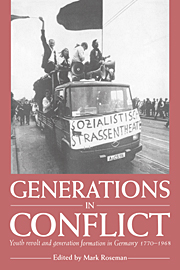Book contents
- Frontmatter
- Contents
- Contributors
- Acknowledgements
- List of abbreviations
- 1 Introduction: generation conflict and German history 1770–1968
- 2 The ideal of youth in late eighteenth-century Germany
- 3 Young Germans and Young Germany: some remarks on the history of German youth in the late eighteenth and in the first half of the nineteenth century
- 4 The battle for the young: mobilising young people in Wilhelmine Germany
- 5 Jewish politics and generational change in Wilhelmine Germany
- 6 The ‘front generation’ and the politics of Weimar Germany
- 7 The New Woman and generation conflict: perceptions of young women's sexual mores in the Weimar Republic
- 8 Generations of German historians: patronage, censorship and the containment of generation conflict 1918–1945
- 9 Gender, generation and politics: young Protestant women in the final years of the Weimar Republic
- 10 The Hitler Youth generation and its role in the two post-war German states
- 11 The BDM generation: a female generation in transition from dictatorship to democracy
- 12 A generation twice betrayed: youth policy in the transition from the Third Reich to the Soviet Zone of Occupation (1945–1946)
- 13 The generation conflict that never was: young labour in the Ruhr mining industry 1945–1957
- 14 The German Kriegskinder: origins and impact of the generation of 1968
- Index
5 - Jewish politics and generational change in Wilhelmine Germany
Published online by Cambridge University Press: 19 October 2009
- Frontmatter
- Contents
- Contributors
- Acknowledgements
- List of abbreviations
- 1 Introduction: generation conflict and German history 1770–1968
- 2 The ideal of youth in late eighteenth-century Germany
- 3 Young Germans and Young Germany: some remarks on the history of German youth in the late eighteenth and in the first half of the nineteenth century
- 4 The battle for the young: mobilising young people in Wilhelmine Germany
- 5 Jewish politics and generational change in Wilhelmine Germany
- 6 The ‘front generation’ and the politics of Weimar Germany
- 7 The New Woman and generation conflict: perceptions of young women's sexual mores in the Weimar Republic
- 8 Generations of German historians: patronage, censorship and the containment of generation conflict 1918–1945
- 9 Gender, generation and politics: young Protestant women in the final years of the Weimar Republic
- 10 The Hitler Youth generation and its role in the two post-war German states
- 11 The BDM generation: a female generation in transition from dictatorship to democracy
- 12 A generation twice betrayed: youth policy in the transition from the Third Reich to the Soviet Zone of Occupation (1945–1946)
- 13 The generation conflict that never was: young labour in the Ruhr mining industry 1945–1957
- 14 The German Kriegskinder: origins and impact of the generation of 1968
- Index
Summary
Until the 1890s German Jews' behaviour in the intolerant social climate of the Kaiserreich was guided by the principle that ‘stepchildren must behave twice as well’. The style of their public activities was cautious and reserved. The early 1890s, however, saw a profound change. Now the Jewish community became much more open, self-assertive, sometimes even belligerent. The contention here is that these changes were closely connected with the entrance into the field of Jewish politics of a new generation, with a distinct set of formative generational experiences.
The aim of this essay is to describe the nature of German Jewry's public activities before the 1890s, examine the changes that then took place, and finally establish and explain the connections between those changes and the age and generational experiences of the various groups of activists that had initiated them.
Since their emancipation in 1871 (1869 in the North German Confederation) the Jews of Wilhelmine Germany had theoretically been equal before the law, but in practice continued to be subject to a variety of forms of discrimination. Their position within German society can best be illustrated by a little story that appeared in some Jewish newspapers in 1891. The story began with a report in the Berlin daily Berliner Boersen-Courier to the effect that the officers of the Prussian Second Guards regiment, stationed in Berlin, had spent a quiet evening with their wives in a Jewish kosher hotel, having been taken there by the regimental doctor, himself a Jew.On learning about the report, the officers of that regiment had immediately prosecuted the editor and reporter for libel.
- Type
- Chapter
- Information
- Generations in ConflictYouth Revolt and Generation Formation in Germany 1770–1968, pp. 105 - 120Publisher: Cambridge University PressPrint publication year: 1995
- 1
- Cited by



